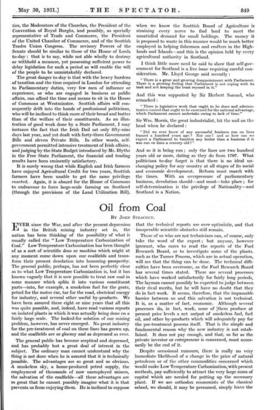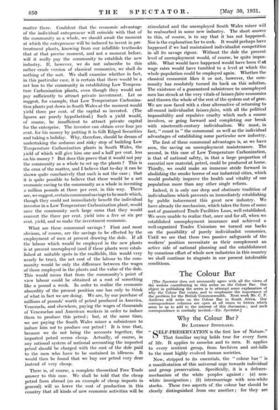Oil from Coal
BY JOHN
STRACHEY.
FFVER since the War, and after the present depression in the British mining industry set in, the nation has been thinking' of the possibility of what is usually called the Low Temperature Carbonization of Coal." Low-Temperature Carbonization has been thought of as a sort of scientific dens es machina which might at any moment come down upon our coalfields and trans- form their present desolation into humming prosperity. The general public, perhaps, has not been perfectly clear as to what Low Temperature Carbonization is, but it has known vaguely that it is now possible to treat raw coal in some manner which splits it into various constituent parts—into, for example, a smokeless fuel for the grate, petrol for the motor Car, tar for the road, electrical energy for industry, and several other useful by-products. We have been assured these eight or nine years that all this was quite possible, and, indeed, have read-various reports on isolated plants in which it-was actually being done on a fairly large scale. The looked-for solution of our mining problem, however, has never emerged. - No great industry for the pre-treatment of coal on these lines has grown up, and the coalfields are as gloomy and :as depressed as ever.
The general public has become sceptical and depressed', and has probably lost a great deal of interest in the subject. The ordinary man cannot understand why the thing is not done when he is assured that it is technically possible. The advantages are so great and so obvious. A smokeless sky, a home-produced petrol supply, the employment of thousands of now unemployed miners, the salvation of the coalfields—all these advantages are so great that he cannot possibly imagine what it is that prevents us from enjoying them. He is inclined to suppose that the technical reports are over optimistic, and that insuperable scientific obstacles still remain.
Those of us who are not technicians can, of course, only take the word of the expert ; but anyone, however ignorant, who cares to read the reports of the Fuel Research Board, or to investigate some of the plants. such as the Turner Process, which are in actual operation, will see that the thing can be done. The technical diffi- culties have been overcome, as the Fuel Research Board has several times stated. There are several processes which have worked satisfactorily for fairly long periods, The layman cannot possibly be expected to judge between their rival merits, but he will have no doubt that they do in fact work. It seems, therefore, that the impassable barrier between us and this _salvation is not technical. It is, as a matter of fact, economic. Although several processes do, in fact, work, none of [them produce at present price levels a net output of smokeless fuel, fuel oil, and other by-products which will adequately pay for the pre-treatment process itself. That is the simple and fundamental reason why the new industry is not estab- lished. It does not pay enough, and that, so far as the private investor or entrepreneur is concerned, must neces- sarily be the end- of it. • Despite occasional rumours, there is really no very immediate likelihood of a change' in the price of natural petroleum or of the other commodities concerned which -Would make Low Temperature Carbonization,:with present methods, pay sufficiently to attract the very large sums of capital which are 'needed for putting up the necessary plant. If we are orthodox economists of the classical school, we should, it may be presumed, simply leave the matter there. Confident that the economic advantage of the individual entrepreneur will coincide with that of the community as a whole, we should await the moment at which the entrepreneur will be induced to invest in pre- treatment plants, knowing from our infallible textbooks that at that precise moment, and not a moment before, will it really pay the community to establish the new industry. If, however, we do not subscribe to this rather crude version of classical economies, we shall do nothing of the sort. We shall examine whether in fact, in this particular case, it is certain that there would be a net loss to the community in establishing Low Tempera- ture Carbonization plants, even though they would not pay sufficiently to attract private investment. Let us suggest, for example, that Low Temperature Carboniza- tion plants put down in South Wales at the moment would yield three per cent. of the capital so invested. (The figures are purely hypothetical.) Such a yield would, of course, be insufficient to attract private capital for the enterprise. The investor can obtain over four per cent. for his money by putting it in Gilt Edged Securities and taking a holiday. Why, therefore, should he dream of undertaking the arduous and risky step of building Low Temperature Carbonization plants in South Wales, the yield of which will give him one and a half per cent. less on his money ? But does this prove that it would not pay the community as a whole to set up the plants ? This is the crux of the matter, and I believe that to-day it can be shown quite conclusively that such is not the case ; that it is quite possible to believe that there would be a net economic saving to the community as a whole in investing x million pounds at three per cent. in this way. There are, we suggest, certain communal savings to be made which, though they could not immediately benefit the individual investor in a Low Temperature Carbonization plant, would save the community such large sums that they would convert the three per cent. yield into a five or six per cent. yield, and so make the investment economic.
What are these communal savings ? • First and most obvious, of course, are the savings to be effected by the employment of men at present drawing the dole. If all the labour which would be employed in the new plants is at present unemployed (and if these plants were estab- lished at suitable spots in the coalfields, this would very nearly be true), the net cost of the labour to the com- munity would be only the difference between the wages of those employed in the plants and the value of the dole. This would mean that from the community's point of view labour could be obtained at a cost of something like a pound a week. In order to realize the economic absurdity of the present position one has only to think of what in fact we are doing. We are, by our purchase of millions of pounds' worth of petrol produced in America, Venezuela, and elsewhere, paying the wages of thousands of Venezuelan and American workers in order to induce them to produce this petrol ; but, at the same time, we are paying the South Wales miner a subsistence to induce him not to produce our petrol ! It is true that, because we do not bring the accounts together, the imported petrol seems cheap. Actually, of course, in any rational system of national accounting the imported petrol should be charged with the cost of the dole paid to the men who have to be sustained in idleness. It would then be found that we buy our petrol very dear instead of very cheap.
There is, of course, a complete theoretical Free Trade answer to this case. We shall be told that the cheap petrol from abroad (as an example of cheap imports in general) will so, lower the cost of production in this country that all kinds of new economic activities will be stimulated and the unemployed South Wales miner will be reabsorbed in some dew industry. The short answer to this, of course, is to say that it has not happened. Nor is the explanation far to seek. It would perhaps have happened if we had maintained individualist competition in all its savage rigour. Without the dole the present level of unemployment would, of course, be quite impos- sible. What would have happened would have been ti at wage rates would have tumbled to a level at which the whole population could be employed again. Whether the classical economist likes it or not, however, the com- munity has resolutely turned its back on this" solution. The existence of a guaranteed subsistence to unemployed men has struck at the very vitals of laissez-faire economics and thrown the whole of the rest of the system out of gear. We are now faced with a clear alternative of returning to all-round individualist laissez-faire, with all the political impossibility and repulsive cruelty which such a course involves, or going forward and completing our break with nineteenth-century individualism. We must, in fact, " count in " the communal as well as the individual advantages of establishing some particular new industry. The first of these communal advantages is, as we have seen, the saving on unemployment maintenance. The second, in this case of Low Temperature Carbonization, is that of national safety, in that a large proportion of essential raw material, petrol, could be produced at home.
Thirdly, we could make an immense stride forward in abolishing the smoke horror of our industrial cities, which would probably improve the health and vitality of our population more than any other single reform.
Indeed, it is only our deep and obstinate tradition of individualism which prevents us immediately establishing by public inducement this great new industry. We have already the mechanism, which takes the form of some sort of guaranteed Trade Facilities Loan, well established.
We seem unable to realize that, once and for all, when we established unemployment insurance and achieved a well-organized Trades Unionism we turned our backs on the possibility of purely individualist economics.
Until we see that these two passive safeguards of the workers' position necessitate as their complement an active side of national planning and the establishment by conscious effort of whole new industries in this country we shall continue to stagnate in our present intolerable conditions.







































 Previous page
Previous page